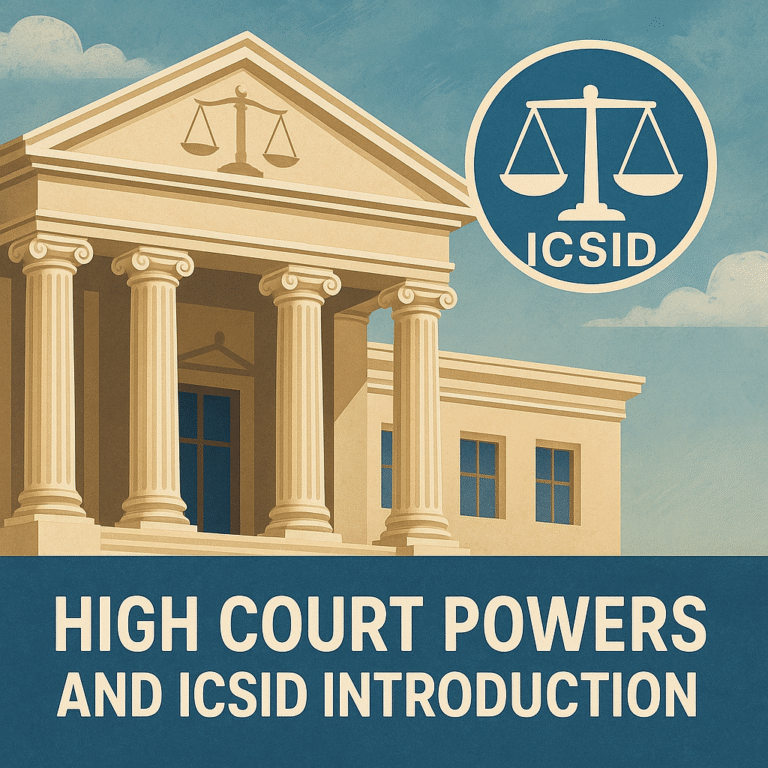Under the ICSID Convention, the International Centre for Settlement of Investment Disputes (ICSID) arranges arbitration for conflicts involving states and foreign investors. Whether domestic courts—like the UK High Court—can stop the implementation of ICSID rulings is a fundamental issue in international arbitration. Balancing responsibilities under the ICSID Convention with EU legislation, the 2020 decision of the UK Supreme Court in Micula and others v Romania ([2020] UKSC 5) offers important analysis of this matter. With an eye toward the Micula case, this blog investigates whether the High Court has authority to halt ICSID award execution.
Background of Micula V Romania 📜
Following violations of the Sweden-Romania Bilateral Investment Treaty (BIT), an ICSID panel granted the Micula brothers and their Romanian businesses (the Claimants) around £150 million against Romania in 2013. The award resulted from Romania’s 2005 abolition of investment incentives, therefore breaching the reasonable expectations of the Claimants. Romania said that following EU State aid guidelines ahead of its 2007 EU admission required the repeal.
Intervention by the European Commission claimed that following the award amounted to illegal State aid according EU law (Article 107 TFEU). The Commission banned Romania from paying the award in 2015, which set off legal disputes involving the UK among other countries where the Claimants tried to enforce the verdict under the Arbitration (International Investment Disputes) Act 1966.
The Part Played by the High Court in ICSID Enforcement:
Articles 53–54 of the ICSID Convention require Contracting States—including the UK—to acknowledge ICSID rulings as legally binding and operate as though they were final domestic court rulings. The 1966 Act implements this responsibility in the United Kingdom by allowing award registration in the High Court ( Section 1) and thereby treating registered awards as High Court judgments for execution ( Section 2).
But the Micula case brought a dilemma: could the High Court stop enforcement owing to EU law duties, especially the duty of honest collaboration (Article 4(3) TEU), which compels member states to avoid contradicting EU decisions, such the Commission’s State assistance ruling?
Micula v Romania Legal Arguments 📚
The Position of the Claimants
The Claimants claimed that save in certain situations (e.g., annulment procedures under Articles 50–52), which did not apply following Romania’s annulment application rejection in 2016, the ICSID Convention and 1966 Act give no ability to stop enforcement. Staying enforcement, they argued, would violate Article 351 TFEU’s pre-accession ICSID commitments, therefore safeguarding member states’ past international agreements with non-EU states.
Romania and the Position of the Commission
Romania and the Commission contended that the High Court might stay enforcement under general court powers (e.g., CPR 3.1(2)(f)) or because the award, interpreted as a domestic judgment, was subject to EU law restrictions. Citing the Commission’s 2015 judgment barring payment as State aid and the continuous EU court processes (GCEU and CJEU) as generating a risk of inconsistent rulings, they underlined the need of honest cooperation.
The Supreme Court’s Decision 🗳️
In a majority ruling delivered on February 19, 2020, the UK Supreme Court answered whether the High Court could halt ICSID award execution. Important conclusions are:
The Court considered whether Article 54(1), “enforce as if it were a final judgment,” permits domestic defenses to execution. Arden and Leggatt LJJ in the Court of Appeal contended that Article 54(1) offers only procedural equivalency, not substantive protections, therefore restricting stays to temporary, procedural bases. Hamblen LJ saw it as complete equivalency, maybe enabling stays depending on EU legislation. Although both readings were debatable, the Supreme Court decided Article 350 TFEU was definitive and did not settle the argument.
Article 351 TFEU: The Court decided that all 154 Contracting governments—including non-EU governments like the US—have rights under UK ICSID obligations, which predate its 1973 EU admission. Article 351 TFEU guards these rights against intervention by EU law. Therefore, the obligation of honest cooperation was absent as implementing the award complemented the international obligations of the UK.
Power to Stay: The Court decided that although the High Court could have limited authority to stop execution for procedural grounds (e.g., under CPR 40.8A), the stay in Micula was substantive, motivated by EU State aid issues. This essentially stopped enforcement indefinitely, against Articles 53–54, therefore surpassing the High Court’s authority under the ICSID Convention.
Finding it illegal under both domestic and international law, the Supreme Court removed the stay and dismissed the security order since it related to the stay.
Explore ICSID arbitration further using the ICSID Convention Overview.
Reversals of High Court Authority 📌
The Micula decision makes clear that the High Court’s authority to halt ICSID award execution is only very limited:
Section 2(2) of the 1966 Act and CPR 62.21(5) allow the High Court to grant temporary stays for procedural reasons—that is, pending ICSID annulment.
Stays based on substantive objections, such as EU State aid prohibitions, are typically incompatible with the ICSID Convention, particularly in cases when Article 351 TFEU protects pre-accession obligations.
EU versus International Obligations: Article 351 TFEU gives the ICSID obligations to non-EU states top priority over EU legal obligations, therefore lowering the likelihood of delays brought on by EU judicial activities.
Final thoughts and lessons 🌟
The ruling of the UK Supreme Court in Micula v Romania validates that the High Court has limited authority to halt ICSID award execution, limited to procedural grounds compatible with the ICSID Convention. Significant stays—especially those contradicting pre-accession international commitments—are illegal. This decision underlines the protective function of Article 350 TFEU in settling disputes between EU and international law and supports the UK’s will to ICSID arbitration.




